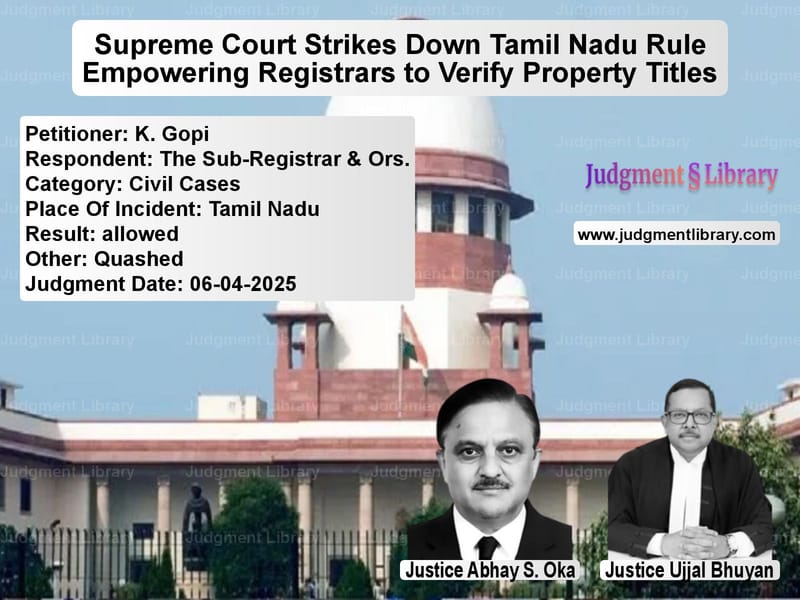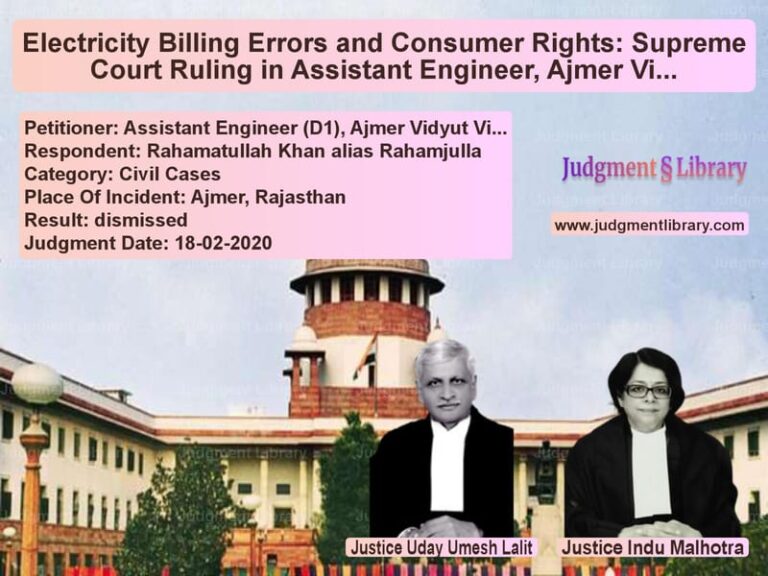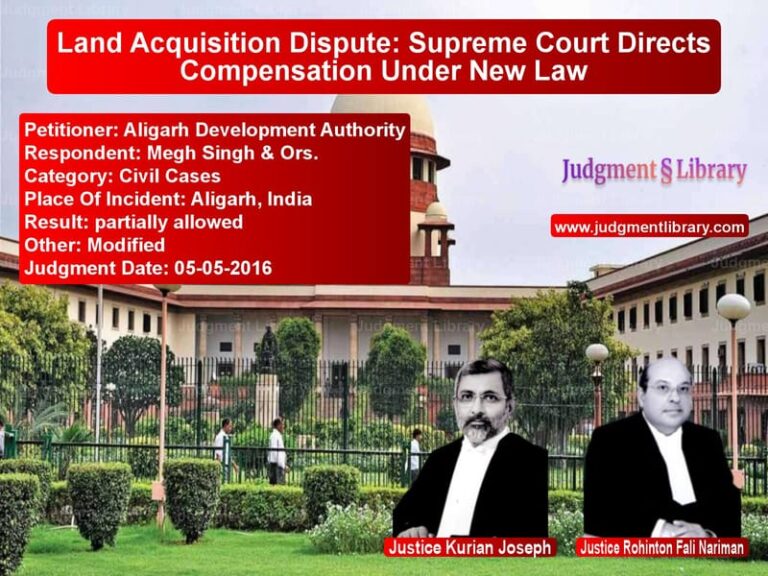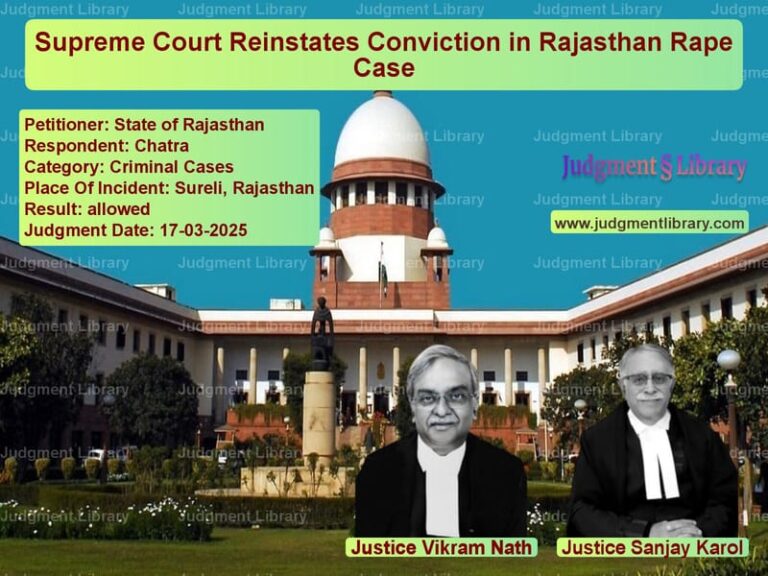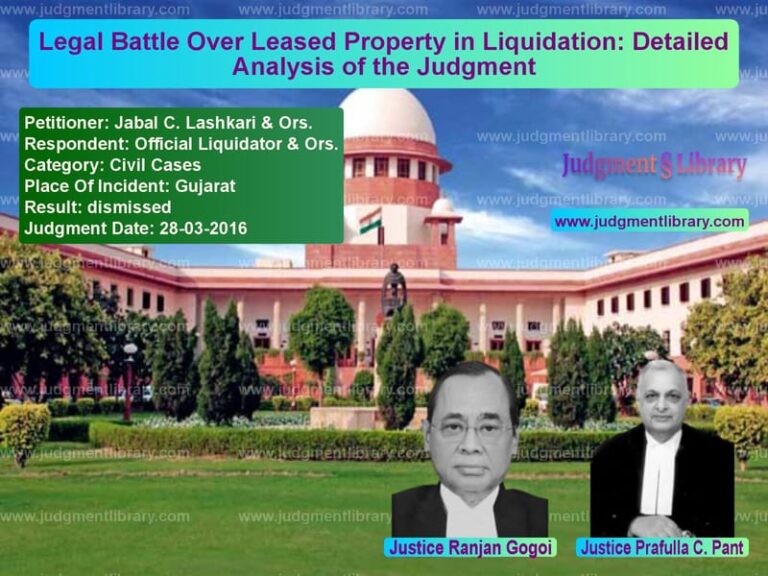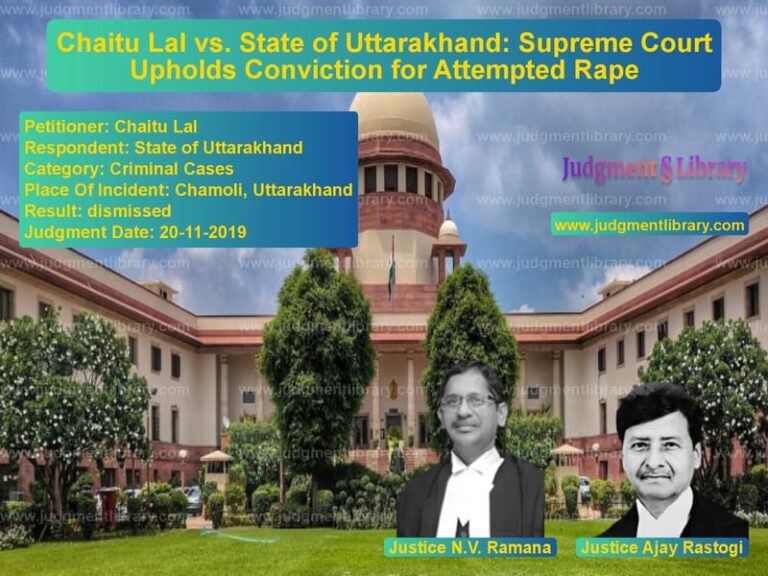Supreme Court Strikes Down Tamil Nadu Rule Empowering Registrars to Verify Property Titles
In a landmark judgment that clarifies the limits of a registrar’s powers, the Supreme Court has struck down Rule 55A(i) of the Tamil Nadu Registration Rules, declaring it ultra vires the Registration Act, 1908. The case arose when K. Gopi’s property sale deed was repeatedly rejected by the Sub-Registrar for failing to prove his vendor’s title, leading to a constitutional challenge against the state’s registration rules.
The Dispute
The case began when:
- On September 2, 2022, Jayaraman Mudaliyar executed a sale deed in favor of K. Gopi
- The Sub-Registrar refused registration citing Rule 55A(i)
- Despite the District Registrar directing reconsideration, registration was again denied
- Writ petitions at the Madras High Court upheld the Registrar’s actions
Key Legal Provisions
Contested Rule 55A(i):
“The registering officer…shall not register the same, unless the presentant produces the previous original deed by which the executant acquired right over the subject property and an Encumbrance Certificate pertaining to the property obtained within ten days from the date of presentation”
Registration Act, 1908 (Section 69):
Empowers rule-making for:
- Safe custody of documents
- Language declarations
- Territorial divisions
- Regulation of fines
- Office proceedings
Arguments Presented
Appellant’s Contentions:
“The Sub-Registrar…is not empowered to go into the question of the title of the person executing the document…Rule 55(A)(i) is ultra vires the provision of the 1908 Act”
State’s Defense:
“Rule 55A has been framed to give effect to the object of preventing registration of bogus transactions…framed well within the Rule-making power conferred under Section 69”
Court’s Analysis
The bench comprising Justices Abhay S. Oka and Ujjal Bhuyan made several crucial observations:
1. Registrar’s Limited Role
“The registering officer is not concerned with the title held by the executant. He has no adjudicatory power to decide whether the executant has any title.”
2. Inconsistency with Parent Act
“Rule 55A(i) is inconsistent with the provisions of the 1908 Act…the rule-making power under Section 69 cannot be exercised to make a Rule that is inconsistent with the provisions of the 1908 Act.”
3. Nature of Registration
The Court clarified that registration only authenticates the execution of documents, not the validity of the transaction or title:
“The execution and registration of a document have the effect of transferring only those rights, if any, that the executant possesses.”
Judgment
The Supreme Court:
- Declared Rule 55A(i) ultra vires the Registration Act, 1908
- Quashed the High Court’s judgment
- Allowed the appellant to present the sale deed for registration within one month
- Directed the Registrar to register the document upon procedural compliance
This judgment reinforces that registrars cannot assume adjudicatory functions regarding property titles, maintaining the distinction between registration and title verification that must be done through proper legal channels.
Petitioner Name: K. Gopi.Respondent Name: The Sub-Registrar & Ors..Judgment By: Justice Abhay S. Oka, Justice Ujjal Bhuyan.Place Of Incident: Tamil Nadu.Judgment Date: 06-04-2025.Result: allowed.
Don’t miss out on the full details! Download the complete judgment in PDF format below and gain valuable insights instantly!
Download Judgment: k.-gopi-vs-the-sub-registrar-&-supreme-court-of-india-judgment-dated-06-04-2025.pdf
Directly Download Judgment: Directly download this Judgment
See all petitions in Property Disputes
See all petitions in Contract Disputes
See all petitions in Specific Performance
See all petitions in Succession and Wills
See all petitions in Lease Agreements
See all petitions in Judgment by Abhay S. Oka
See all petitions in Judgment by Ujjal Bhuyan
See all petitions in allowed
See all petitions in Quashed
See all petitions in supreme court of India judgments April 2025
See all petitions in 2025 judgments
See all posts in Civil Cases Category
See all allowed petitions in Civil Cases Category
See all Dismissed petitions in Civil Cases Category
See all partially allowed petitions in Civil Cases Category

